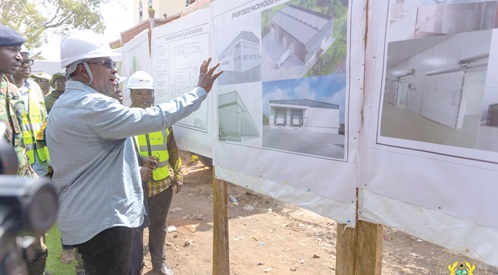President John Dramani Mahama yesterday officially launched the Vegetable Development Project, a component of the government's Feed Ghana Programme, declaring it the start of a "new chapter in our national agricultural renaissance."
The project, dubbed Yeredua, was launched in Kukuom, the capital of the Asunafo South District in the Ahafo Region, to reposition Ghana as a net vegetable producer and address the nation's heavy reliance on imports.
Present at the ceremony were the Minister of Food and Agriculture, Eric Opoku; the Ahafo Regional Minister, Charity Gardner; Members of Parliament, farmers and youth and women in agricultural groups.
President Mahama noted that “vegetables are indispensable to every Ghanaian household.
Yet for many years, our inability to produce adequate volumes of these products, particularly during the dry season, has forced us to rely heavily on imports.
"These imports expose our economy to price fluctuations, foreign exchange losses, and unstable supply chains," he added.
The President outlined the project's core objectives, which include expanding large-scale and smallholder production of tomatoes, onions and peppers using improved seed varieties and modern agronomic practices.
The initiative is designed to "strengthen the entire value chain from input supply and production to aggregation, storage, processing, and marketing" and to "create dignified, predictable jobs, especially for young people, women, and persons with disabilities."
Irrigation systems
A critical component of the project is the provision of irrigation infrastructure.
"At the heart of this plan is a simple and undeniable truth. Without water, vegetable production cannot thrive," the President said.
President Mahama explained that "without year-round production, we cannot achieve food security or reduce our imports."
To achieve this, the Vegetable Development Project will deliver solar-powered irrigation systems covering 60 hectares of land across six communities.
"These installations will provide reliable water supply, low energy costs based on solar solutions, reduce carbon emissions, and ensure climate resilience," he said.
Farmers involved have already begun receiving support in the form of improved seeds, organic fertiliser, agronomic training, and digital advisory services.
President Mahama also announced that "a committed buyer system has been introduced to secure predictable markets for all the farmers' produce."
Additionally, "a modern packhouse will be constructed to handle the grading, the sorting, packaging, and cold chain management of all the vegetables that are produced."
The entire project is scheduled for completion within 12 months.
President Mahama confirmed that this model "will be replicated in many other parts of the country, especially in the north, where water availability is a major challenge."
He reaffirmed the government's broader commitment, stating, "with discipline, unity and a shared sense of purpose, we will feed Ghana, we will grow Ghana, and we will transform Ghana."
The project
The Yeredua project’s primary goal is to transform the vegetable sub-sector, achieve food security, and reduce the country's reliance on imported vegetables by promoting local cultivation.
The project is designed to meet key objectives such as significantly reducing vegetable imports from neighbouring countries, boosting the local production and productivity of various vegetables, including tomatoes, peppers and garden eggs, and creating sustainable employment opportunities to make the agricultural sector more attractive to young people.
The project is expected to employ a multifaceted implementation strategy, including investing in controlled-environment farming methods such as greenhouse technologies and promoting vegetable cultivation in urban and peri-urban areas.
The initiative also encourages backyard gardening among households and schools to enhance self-sufficiency and nutrition, and supports institutional farming for entities such as senior high schools.
A critical part of the strategy involves providing robust infrastructure support, which encompasses access to irrigation, including solar-powered boreholes, as well as quality agro-inputs and mechanisation services delivered through Farmers' Service Centres.

